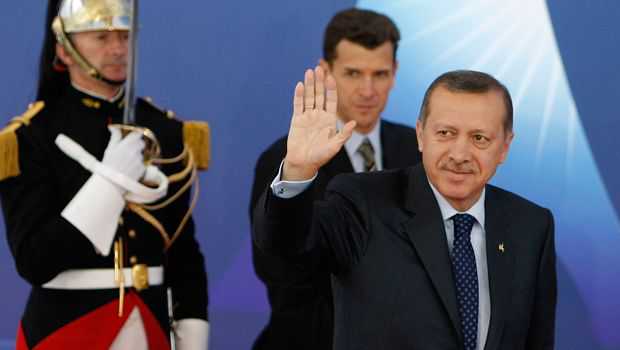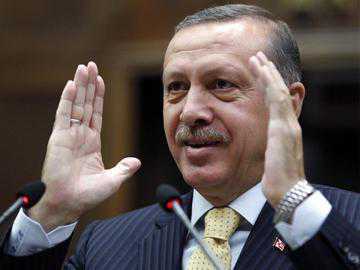
Turkish Prime Minister Recep Tayyip Erdogan arrives for the first working session at the G20 summit in Cannes, France. (AP)
A combination of the aftermath of the global financial crisis; the seemingly intractable euro zone debt crisis with neighboring rival, Greece, bearing the brunt of the criticism; and endless obfuscation and simmering opposition by some diehard opponents to Turkish membership of the European Union; and the uncertainty in the Middle East and North Africa (MENA) region because of the so-called “Arab Spring,” is forcing Ankara to look beyond its traditional trading partners and markets in the EU and the Middle East and to consider alternative ways of raising funds and investments into the country.
Turkish companies are now exploring opportunities and are already active in sub-Saharan Africa; South and East Asia and even further afield in Latin America.
The process is not one-sided. In fact, Turkey and Malaysia, for instance, are forging greater cooperation in trade, investment and especially linkages in the Islamic financial industry between the two markets.
How times are changing. The new “Sick Men of Europe” are Greece, Portugal, Ireland, Italy and possibly Spain — a big enough quorum to form their own unique club.
Turkey on the other hand, with its projected six percent plus GDP growth rate for 2011, is walking tall — politically confident with the ruling Erdogan government recently returned with a landslide in its third successive democratic elections; economically far more stable sustained especially by export diversification and robust domestic demand; and the banking system weathering the global financial crisis far better because it learnt the lessons from its own financial crisis in 2001.
The relatively modest volume of trade and investment between the Turkey and Malaysia currently reflects the enormous opportunity for further growth.
During the recent visit of Malaysian Prime Minister Najib Razak to Turkey, he and his Turkish counterpart, Prime Minister Recep Tayyip Erdogan, agreed a new target for bilateral trade between the two countries from the current $1.3 billion to $5 billion.
Turkish investors and financial institutions could use Malaysia as a gateway to the ASEAN region, while the Malaysian financial community could use Turkey as a gateway to Central Asia and Europe.
The two governments are also working on signing a double tax treaty and a bilateral trade agreement.
Turkey is the 17th largest economy in the world; it has a population of 70 million of which the average age is 29, which is the youngest in Europe; it is the 16th largest steel producer in the world; and the country averaged a GDP growth rate of 10.3 percent for the first half of 2011.
While Turkey traditionally has had strong business relations with fellow Middle Eastern countries, its relations with fellow Muslim countries outside the MENA region, has been woefully neglected partly because of the then certainty of the economic relations with the EU and GCC markets and partly because of the inherent conservatism of the Turkish establishment whose focus was membership of the European club and rapprochement with the Middle East for political and economic expediency respectively.
With the emergence of Malaysia as the powerhouse of the global Islamic finance industry, which in the Southeast Asian country has a unique connectivity with real economic activities including infrastructure financing, project finance, trade finance, SME financing, consumer finance and even wealth management and creation, it is not surprising that Ankara is seeking synergies with Kuala Lumpur in this nascent but fast growing industry.
Both Malaysia and Turkey are secular states, albeit the former has less sensitivities about Shariah (Islamic legal) applications in finance and in limited personal law.
Malaysia, privately frustrated by the inertia of regulatory and legal developments in the Islamic finance space in most of the Arab Middle East countries, is itself exploring new markets as part of its Malaysia International Islamic Finance Center (MIFC) initiative which aims to make Malaysia the global hub for sukuk origination, fund management, as a platform to raise funds and to effect cross-border transactions. Malaysian Islamic financial institutions, with a proven track record in consumer finance, asset management, fixed-income instruments and sukuk, are keen to impart their experience through advisory and management services to the Turkish market where sukuk origination and fund management is merely set to take off.
Bank Negara Malaysia (BNM), the central bank, indeed organized an Islamic finance road show to Istanbul at the end of September 2011 which included bilateral briefings, a business seminar, an address on the future of Islamic finance by former Malaysian Premier Mahathir Mohamed and panel discussions on capital markets and fund management.
The aim of the seminar was to strengthen economic, business and Islamic financial linkages for the mutual benefits of both countries.
The theme of the road show and seminar, “Malaysia and Turkey: The New Silk Route in Islamic Finance — Strategies for Collaboration, Cooperation and Smart Partnership,” could not be more pertinent.
BNM Deputy Gov. Muhammad bin Ibrahim, in his opening address, reminded that “the emergence of the ‘Silk Route’, a term coined by (BNM) Gov. Zeti Akhtar Aziz in 2006, opens up exciting prospects for countries and businesses.
The new ‘Silk Route’ not only carries traditional trade of goods and services of old but also manufactured goods, technological innovation and know-how, portfolio flows, private equity investment and mobility of human capital and knowledge.
Today, Islamic financial products and services are truly ‘new’ additions to this trade.”
The truth is that Malaysia and Turkey have a natural fit which for various reasons have until recently been overlooked by both countries. Both countries are functional parliamentary democracies enjoying relatively political stability.
Both countries have strong market economies with robust support from the respective governments, and flourishing private sectors, the backbone of their prosperity and progress.
Islamic banking in both countries started uncannily at the same time in 1983 when the Islamic Banking Act under BAFIA was enacted in Malaysia and the special decree establishing Interest-free special finance houses was adopted in Turkey.
As such both countries have established Islamic financial institutions, albeit the Malaysian sector is much bigger and today accounts for 22 percent of banking assets market share compared with almost 5 percent in Turkey.
Turkey today is opening up to participation banking, the Turkish euphemism for Islamic banking. The market has its peculiarities, but it offers genuine opportunities in this space.
It is no secret that politicians in Ankara prefer the dual banking model of Malaysia which sees the Islamic banking system develop side by side the conventional system and offering customers a choice as to which products they prefer, without imposing religious constraints or demands on the secular state.
In a changing world, which is currently experiencing serious financial and economic challenges, the search for new alternatives that could mitigate the contemporary issues and challenges is imperative.
This, maintained Deputy Gov. Ibrahim is where Islamic finance can fit in and play a meaningful role, especially with its emphasis on the attainment of socio-economic goals based on Shariah principles; on a strong linkage to productive economic activity to generate legitimate income; and on accountability, fairness and transparency.
These are the values that could also serve as a resilient form of financial intermediation; as an effective intermediary for the conduct of global business including promoting greater intra-regional trade not only within Asia but between the various regions of emerging markets; and contribute to sustainable global economic growth and financial stability.
He identified five key areas of possible cooperation between the two countries.
The include sukuk origination, cross-border financial activities, fund management, joint product innovation, and Islamic finance education and research.
“Malaysia,” he added, “welcomes the Turkish financial and business community to use its comprehensive and tested infrastructure with its extensive investor network as a platform to raise funds such as sukuk and Islamic syndication financing. The multi-currency Sukuk market in Malaysia is well developed and active with over 60 percent of the outstanding Sukuk in the world originating from Malaysia. Collaboration in issuance of sukuk would benefit Turkey, as the country’s aggressive diversification of its industrial base and services sectors will require huge financing needs that could be partially met through the Islamic financial markets.”
At the same time, Malaysian market players stress the importance of sovereign Turkey issuing a benchmark Sukuk and are keen to participate in arranging and structuring any such issuance.
Turkish financial institutions at the same time could network with Malaysian-based investors, and practitioners to facilitate more business opportunities who could help to structure funds for investment abroad, including into the emerging markets.
Turkish banks and institutions could join Bursa Suq Al Sila’, the world’s first end-to-end Islamic multi-currency commodity trading platform, to facilitate liquidity management in the Islamic financial market.
This fully-electronic platform facilitates sukuk structuring, Islamic financing and investment transactions including inter-bank placements and customer deposits, by applying the concept of Murabaha and Tawarruq.
Since its establishment in 2009, 23 commodity trading participants from Malaysia, the Middle East and Europe have been registered with Bursa Suq Al-Sila’, contributing to the growth in its trading volume where 1370 trades were recorded in Q1, 2011 with a total value of $18 billion as compared to 728 trades in the final quarter of 2010 that totaled to an estimated $11 billion.
Following the launch of the first Participation Bank Index by the Istanbul Stock Exchange earlier this year, the investment products introduced in the Turkish market have been expanded to include Islamic equity funds and products.
Through collaboration and strategic alliances between Malaysian Islamic fund management companies and the participation banks in Turkey, the development and distribution of Shariah-compliant funds across borders could be made possible and new investment options to divest the savings of retail clients, as well as in the development of investment strategies to meet the needs of high net-worth individuals or sovereign wealth funds.
This cooperation would be further enhanced should Bursa Malaysia and the Istanbul Stock Exchange launch a Mutual Equity Index for the two countries; and dual listings on the two exchanges.
Malaysian and Turkish market players and institutions could jointly develop innovative products and investment instruments provide consultation and advisory services to support the development of Islamic finance.
Similarly, collaboration can be explored between the International Center of Education in Islamic Finance (INCEIF) and Turkish universities to develop human capital to support the participation banking sector in Turkey.




